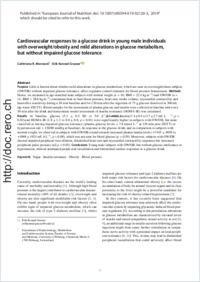Cardiovascular responses to a glucose drink in young male individuals with overweight/obesity and mild alterations in glucose metabolism, but without impaired glucose tolerance
- Monnard, Cathriona R. Department of Endocrinology, Metabolism and Cardiovascular System, Faculty of Science and Medicine, University of Fribourg, Switzerland
- Grasser, Erik Konrad Department of Endocrinology, Metabolism and Cardiovascular System, Faculty of Science and Medicine, University of Fribourg, Switzerland
-
21.10.2019
Published in:
- European Journal of Nutrition. - 2020, vol. 59, no. 6, p. 2747-2757
English
Little is known about whether mild aberrations in glucose metabolism, which are seen in overweight/obese subjects (OW/OB) without impaired glucose tolerance, affect regulator control elements for blood pressure homeostasis. Methods Hence, we measured in age-matched male subjects with normal weight (n = 16; BMI = 22.4 kg m−2) and OW/OB (n = 11; BMI = 28.6 kg m−2) continuous beat-to-beat blood pressure, heart rate, stroke volume, myocardial contractility and baroreflex sensitivity during a 30 min baseline and for 120 min after the ingestion of 75 g glucose dissolved in 300 mL tap water (OGTT). Blood samples for the assessment of plasma glucose and insulin were collected at baseline and every 30 min after the drink and homeostatic model assessment of insulin resistance (HOMA-IR) was calculated. Results At baseline, glucose (5.3 ± 0.4 SD vs 5.0 ± 0.4 mmol L−1; p = 0.01), insulin (7.4 ± 0.4 vs 3.7 ± 2.7 mU L−1; p = 0.02) and HOMA-IR (1.8 ± 1.3 vs 0.8 ± 0.6; p = 0.01) were significantly higher in subjects with OW/OB, but none classified as having impaired glucose tolerance (plasma glucose levels 7.8 mmol L−1 at 120 min post- OGTT) or hypertension (all 130/80 mmHg at baseline). In response to the glucose drink, and in comparison to subjects with normal weight, we observed in subjects with OW/OB a trend towards increased plasma insulin levels (+7445 ± 4858 vs. +4968 ± 1924 mU h L−1; p = 0.08), which was not seen for blood glucose (p = 0.59). Moreover, subjects with OW/OB showed impaired peripheral vasodilation, diminished heart rate and myocardial contractility responses but increased peripheral pulse pressure (all p 0.05). Conclusions Young male subjects with OW/OB, but without glucose intolerance or hypertension, showed attenuated peripheral vasodilation and diminished cardiac responses to a glucose drink.
- Faculty
- Faculté des sciences et de médecine
- Department
- Département de Médecine
- Language
-
- English
- Classification
- Dietetics, nutrition
- License
-
License undefined
- Identifiers
-
- RERO DOC 327700
- DOI 10.1007/s00394-019-02120-3
- Persistent URL
- https://folia.unifr.ch/unifr/documents/308328
Statistics
Document views: 119
File downloads:
- pdf: 216
